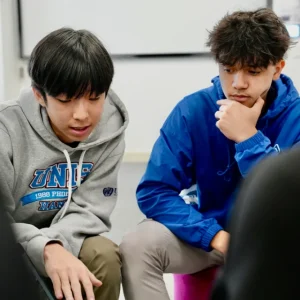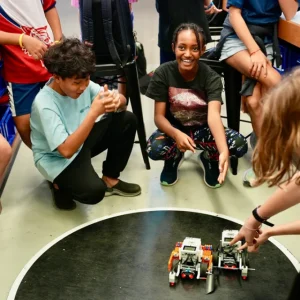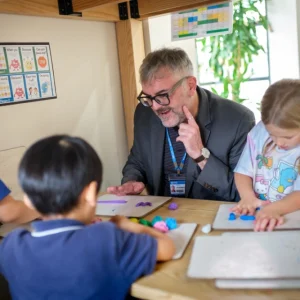Explore the impact of technology on education through six key approaches that enhance learning, collaboration, and access to information in classrooms.
The impact of technology on education has been transformative, reshaping traditional learning paradigms. In recent years, educational institutions have increasingly embraced digital tools and platforms to enhance the learning experience.
From interactive whiteboards to artificial intelligence-powered tutoring systems, technology is revolutionising how knowledge is imparted and acquired, paving the way for more engaging, personalised, and efficient educational practices.
The Impact of Technology on Education
How has technology impacted education? Technology empowers various aspects of the educational experience, from classroom dynamics to personalised learning approaches. Let us explore six key approaches that highlight the impact of technology on education.
1. Boosted Collaboration and Communication
Educational technology has significantly enhanced collaboration and communication in the learning environment, highlighting the impact of technology on education. It has broken down barriers, allowing for seamless interaction between teachers and students and among students. Online platforms and learning games provide opportunities for students to work together to solve problems, share ideas, and support one another.

Moreover, technology facilitates one-on-one interactions between teachers and students. Students can quickly seek clarification on complex topics or request additional assistance outside classroom hours.
The ability to upload and submit assignments digitally has also streamlined the homework process, enabling teachers to access and review work efficiently using their laptops or other devices.
2. Better Access to Information
The advent of the internet has revolutionised access to information, empowering students to explore vast resources beyond traditional textbooks. Online databases, academic journals, and educational websites are valuable complements to standard curricula, enriching students’ understanding and promoting a more holistic approach to learning.

Previously, access to information was often limited to scarce textbooks, necessitating long journeys or extended hours at school to complete assignments. Libraries were often stocked with outdated or irrelevant materials.
Now, students can access a wide range of up-to-date resources from anywhere with just a few clicks, provided they have an internet connection and a suitable device.
3. Enhanced Classroom Engagement
Interactive whiteboards, educational applications, and multimedia resources capture students’ attention, transforming lessons into dynamic and memorable experiences. These advancements demonstrate the impact of technology on education and highlight a significant evolution in how learning is delivered and experienced.

Additionally, the introduction of AI chatbots has the potential to revolutionise higher education. These intelligent assistants can provide round-the-clock student support, answering questions about courses and enrollment processes. Furthermore, these AI tools can offer personalised learning experiences by adapting to individual student needs, potentially enhancing engagement and academic success.
4. Personalised and Adaptable Learning Experiences
Technology allows educators to customise learning experiences to meet individual students’ needs, learning styles, and paces. The effect of technology on education is evident through adaptive learning platforms that assess students’ strengths and weaknesses and deliver customised content that meets their requirements.

The flexibility offered by technology allows for 24/7 access to educational resources. Classes can be conducted online or in a hybrid format, combining remote learning with in-person sessions. The data generated through these online activities provides valuable insights for teachers, helping them identify areas where students may need additional support.
5. Curiosity Driven by Interactive Content
Engaging and educational content can spark inquisitiveness in students and boost their curiosity, which research has linked to academic success. Teachers can leverage various technologies, such as augmented reality, videos, or podcasts, to create compelling content that enhances understanding of complex concepts.

For instance, students can incorporate videos into their assignments or interact with peers from across the globe, broadening their perspectives and driving curiosity-led learning.
6. Digital Age Skill Building
Using various digital tools and platforms, students develop essential skills such as digital literacy, critical thinking, problem-solving, and collaboration. Understanding the impact of technology on education helps educators tailor their approaches to enhance learning outcomes.

At UNIS Hanoi, our comprehensive device programme exemplifies the application of technology in education and illustrates how technology has changed education positively.
Students in grades 2-8 are provided with devices throughout the academic year, while High School students participate in a Bring Your Own Device (BYOD) programme. The school uses Google Apps for Education and combines iPads, Chromebooks, and MacBooks to support learning across different grade levels.

In the early years (ECC to Grade 3), students can access multimedia resources, including iPads, Chromebooks, and other mobile devices. As students progress through Grades 4-6, they are each issued a Chromebook and have shared access to iPads.
In Grades 7-8, students are provided with individual MacBooks, allowing greater access to applications and software. High School students (Grades 9-12) bring family-owned devices running English versions of either Windows or MacOS, following specific BYOD guidelines provided by the Admissions Team upon enrollment.
The Impact of Technology on Education: Challenges and Solutions
While the effect technology has on education is transformative, several challenges must be addressed to ensure effective integration.
- Digital Divide: Unequal access to technology and the internet creates disparities in educational opportunities.
- Excessive Tech Usage: Overreliance on technology can undermine the significance of traditional teaching methods and face-to-face interactions.
- Privacy and Data Security Concerns: Increased use of digital tools raises concerns about safeguarding student data and maintaining privacy.
- Educator Training: Many teachers require further training to incorporate technology into their teaching practices effectively.

To address these challenges, UNIS Hanoi implements several initiatives. To bridge the digital divide, the school provides students with devices and ensures access to necessary digital tools. We carefully balance technology use with traditional methods, combining digital and face-to-face learning experiences.

Moreover, robust cybersecurity measures protect student data, and ongoing professional development programmes equip educators with the skills to integrate technology effectively into the classroom.
Experience the Future of Learning at UNIS Hanoi
The impact of technology on education can enhance collaboration, improve access to information, increase engagement, facilitate personalised learning, create curiosity-driven content, and develop digital skills. While challenges exist, UNIS Hanoi continually develops and implements innovative solutions.

Are you ready to embrace the future of education? For personalised guidance or information about limited seats available for the current school year’s Semester 2, contact the Admissions team directly at admissions@unishanoi.org. Your journey towards an innovative, technology-enhanced education starts here at UNIS Hanoi!
Author Profile

- UNIS Hanoi is ever-evolving, but one thing that remains is our passion to nurture and equip students to be agents of change for a better world.
Latest entries
 Calendar, News and Publications1 Oct 2025Student Voice and Choice: Benefits & 6 Best Practices
Calendar, News and Publications1 Oct 2025Student Voice and Choice: Benefits & 6 Best Practices Calendar, News and Publications22 Sep 2025Stress Management Techniques for Students: 8 Proven Methods
Calendar, News and Publications22 Sep 2025Stress Management Techniques for Students: 8 Proven Methods Calendar, News and Publications21 Sep 2025What is an Inclusive Learning Environment? A Parent’s Guide
Calendar, News and Publications21 Sep 2025What is an Inclusive Learning Environment? A Parent’s Guide Calendar, News and Publications21 Sep 20258 Game-Changing Innovative Teaching Strategies
Calendar, News and Publications21 Sep 20258 Game-Changing Innovative Teaching Strategies